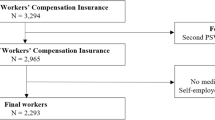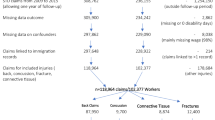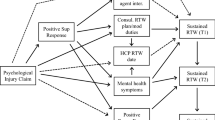Abstract
Purpose
To identify predictors of return to work, duration of time off work, and claim closure for first responders experiencing injuries or illnesses, and summarize the claim data.
Methods
First responder claims collected between January 2012 and July 2017 were obtained from a disability management company. Known predictors of return to work were extracted from the data including age, sex, diagnosis, years of service, claim lag, medical report lag, and the return-to-work duties. Survival analyses were performed to identify predictors of return to work and claim closure using the Cox proportional regression analysis. Log-rank tests were performed to identify predictors that affected the rate of return to work and claim closure. Summary statistics were performed for the injury and return-to-work data.
Results
60 of the 67 (89.6%) identified first responders returned to work within the data collection period. Musculoskeletal injuries predicted an increased likelihood of returning to work (hazard ratio = 2.0, 95%CI = 1.14–3.60) and a shorter duration of time off work (37 days on average) compared to mental health issues. Everyday of claim lag and medical report lag predicted a 2% decrease in likelihood of return to work. Returning to work was the only predictor of claim closure. 45 (67.2%) first responders returned to their pre-absence duties. 22 (32.8%) mental health claims and 45 (67.2%) injury claims were identified.
Conclusions
89.6% of first responders returned to work, although only 67.2% returned to their pre-absence duties. Predictors of return to work included injury type, as first responders with musculoskeletal injuries returned to work sooner, and claim and medical lag delayed the return to work.
Similar content being viewed by others
Availability of data and materials
The datasets generated during and/or analysed during the current study are available from the corresponding author on reasonable request. The data are not publicly available because the data belongs to an organization (Organizational Solutions Incorporated) and contains injury claim detail of their clients.
Code availability
Codes used for the data analysis in STATAIC 14 are available from the corresponding author upon request.
References
Accessibility for Ontarians with Disability Act (2019) Accommodating workers with mental illnesses: Part two. Accessibility for Ontarians with Disability Act. https://aoda.ca/accommodating-workers-with-mental-illnesses-part-two/#:~:text=%20Employers%20can%20create%20a%20mentally%20healthy%20workplace,Ensuring%20that%20workloads%20permit%20work-life%20balance%20More%20. Accessed 1 Sept 2019
American Psychiatric Association (2013) Diagnostic and statistical manual of mental disorders (DSM-5®). American Psychiatric Pub. https://www.psychiatry.org/psychiatrists/practice/dsm. Accessed 1 Sept 2019
Bellis C, Chu BW, de Jong P, Heller G (2007) Development of a standardised measure of return-to-work in workers’ compensation. Institute of Actuaries of Australia XIth Accident Compensation Seminar, Grand Hyatt Melbourne, Australia. https://actuaries.asn.au/Library/3.b_ACS07_paper_Chu_Jong_Development%20of%20a%20standardised%20RTW%20measure.pdf. Accessed 1 Sept 2019
Benight CC, Bandura A (2004) Social cognitive theory of posttraumatic recovery: the role of perceived self-efficacy. Behav Res and Ther 42(10):1129–1148. https://doi.org/10.1016/j.brat.2003.08.008
Bureau of Labor Statistics (1992) Occupational injury and illness classification manual. US Department of Labor Washington, DC. https://www.bls.gov/iif/oshwc/oiicm.pdf. Accessed 5 Mar 2019
Cancelliere C, Donovan J, Stochkendahl MJ, Biscardi M, Ammendolia C, Myburgh C, Cassidy JD (2016) Factors affecting return to work after injury or illness: best evidence synthesis of systematic reviews. Chiropr Man Ther 24:1–23. https://doi.org/10.1186/s12998-016-0113-z
Carleton RN, Afifi TO, Turner S et al (2018) Mental disorder symptoms among public safety personnel in Canada. Can J Psychiatry 63:54–64. https://doi.org/10.1177/0706743717723825
Cloutier E, Champoux D (2000) Injury risk profile and aging among Québec firefighters. Int J Ind Ergon 25(5):513–523. https://doi.org/10.1016/S0169-8141(99)00038-4
Eakin JM, MacEachen E, Clarke J (2003) ‘Playing it smart’ with return to work: small workplace experience under Ontario’s policy of self-reliance and early return. Policy Pract Health Saf 1(2):19–41. https://doi.org/10.1080/14774003.2003.11667635
Franche R-L, Cullen K, Clarke J, Irvin E, Sinclair S, Frank J, Institute for Work & Health (IWH) Workplace-based RTW Intervention Literature Review Research Team.Institute for Work & Health (IWH) Workplace-based RTW Intervention Literature Review Research Team (2005) Workplace-based return-to-work interventions: a systematic review of the quantitative literature. J Occup Rehabil 15(4):607–632
Government of Canada (2016) Managing for wellness. Disability Management Handbook for Managers in the Federal Public Service. https://www.canada.ca/en/treasury-board-secretariat/services/values-ethics/diversity-equity/disability-management/managing-wellness-disability-management-handbook-managers-federal-public-service.html. Accessed 1 Sept 2019
Government of Canada (2019) Supporting Canada’s public safety personnel: An action plan on post-traumatic stress injuries. Public Safety Canada. https://www.publicsafety.gc.ca/cnt/rsrcs/pblctns/2019-ctn-pln-ptsi/index-en.aspx Accessed 5 Jan 2021
Greinacher A, Derezza-Greeven C, Herzog W, Nikendei C (2019) Secondary traumatization in first responders: a systematic review. Eur J Psychotraumatol 10:1562840. https://doi.org/10.1080/20008198.2018.1562840
Hill R, Brunsden V (2009) ‘Heroes’ as victims: role reversal in the fire and rescue service. Ir J Psychol 30:75–86. https://doi.org/10.1080/03033910.2009.10446299
Jahnke SA, Poston WSC, Jitnarin N, Haddock CK (2012) Health concerns of the U.S. Fire Service: perspectives from the firehouse. Am J Health Promot 27(2):111–118. https://doi.org/10.4278/ajhp.110311-QUAL-109
Jones S (2017) Describing the mental health profile of first responders: a systematic review. J Am Psychiatr Nurses Assoc 23(3):200–214. https://doi.org/10.1177/1078390317695266
Krause N, Frank JW, Dasinger LK, Sullivan TJ, Sinclair SJ (2001) Determinants of duration of disability and return-to-work after work-related injury and illness: challenges for future research. Am J Ind Med 40(4):464–484. https://doi.org/10.1002/ajim.1116
LaTourrette T, Loughran DS, Seabury SA (2008) Occupational safety and health for public safety employees: Assessing the evidence and the implications for public policy (Final No. 792; pp. 1–155). RAND Institute for Civil Justice and Infrastructure, Safety, and Environment. https://www.rand.org/pubs/monographs/MG792.html. Accessed 5 Mar 2019
Liao H, Arvey RD, Butler RJ, Nutting SM (2001) Correlates of work injury frequency and duration among firefighters. J Occup Health Psychol 6(3):229–242. https://doi.org/10.1037/1076-8998.6.3.229
MacEachen E, Clarke J, Franche R-L, Irvin E, Workplace-based Return to Work Literature Review Group (2006) Systematic review of the qualitative literature on return to work after injury. Scand J Work Environ Health 32(4):257–269
Murphy S (1991) Human responses to catastrophe. Annu Rev Nurs Res 9:57–76. https://doi.org/10.1891/0739-6686.9.1.57
Nieuwenhuijsen K, Verbeek JH, de Boer AG, Blonk RW, van Dijk FJ (2006) Predicting the duration of sickness absence for patients with common mental disorders in occupational health care. Scand J W Environ Health 32:67–74
Norwood PJ, Rascati JN (2012) Recognizing and combating firefighter stress. Fire Engeneering 165(12):87–89.https://www.fireengineering.com/ content/dam/fe/online-articles/documents/FEU/FEU-NorwoodDec12.pdf. Accessed April 21, 2019
Poston WSC, Haddock CK, Jahnke SA, Jitnarin N, Tuley BC, Kales SN (2011) The prevalence of overweight, obesity, and substandard fitness in a population-based firefighter cohort. J Occup Environ Med 53(3):266–273. https://doi.org/10.1097/JOM.0b013e31820af362
Reichard AA, Jackson LL (2009) Occupational injuries among emergency responders. Am J Ind Med 53:1–11. https://doi.org/10.1002/ajim.20772
Robinson HM, Sigman MR, Wilson JP (1997) Duty-related stressors and PTSD symptoms in suburban police officers. Psychol Rep 81(3):835–845. https://doi.org/10.2466/pr0.1997.81.3.835
Scheelar JF (2002) A return to the worker role after injury: Firefighters seriously injured on the job and the decision to return to high-risk work. Work 19(2):181–184
Schultz IZ, Gatchel RJ (2006) Handbook of complex occupational disability claims: Early risk identification, intervention, and prevention. New York, NY: Springer Science & Business Media
Seabury SA, McLaren CF (2012) The frequency, severity, and economic consequences of musculoskeletal injuries to firefighters in California. Rand Health Q 2(3):4
Sinden K, MacDermid JC (2014) Does the Knowledge-to-Action (KTA) framework facilitate physical demands analysis development for firefighter injury management and return-to-work planning? J Occup Rehabil 24:146–159. https://doi.org/10.1007/s10926-013-9442-0
Steenstra I, de Bruin L, Mahood Q, Irvin E, Hogg-Johnson S, Heijmans M, Verbeek J (2011) Prognostic factors for duration of sick leave in patients sick listed with acute low back pain: an update of a systematic review of the literature. Occup Environ Med 68(Suppl 1):A74–A75. https://doi.org/10.1136/oemed-2011-100382.242
van Vegchel N, de Jonge J, Bosma H, Schaufeli W (2005) Reviewing the effort–reward imbalance model: drawing up the balance of 45 empirical studies. Soc Sci Med 60(5):1117–1131. https://doi.org/10.1016/j.socscimed.2004.06.043
World Health Organization (1992) The ICD-10 classification of mental and behavioural disorders: Clinical descriptions and diagnostic guidelines. Geneva: World Health Organization. http://apps.who.int/iris/handle/10665/37958. Accessed 5 Mar 2021
Young AE, Wasiak R, Roessler RT, McPherson KM, Anema JR, van Poppel MNM (2005) Return-to-work outcomes following work disability: stakeholder motivations, interests and concerns. J Occup Rehabil 15(4):543–556. https://doi.org/10.1007/s10926-005-8033-0
Acknowledgements
The dataset was provided by Dr. Liz Scott and Organizational Solutions Incorporated. Joy MacDermid was supported by a Canadian Institutes of Health Research Chair in Gender, Work and Health and the Dr James Roth Chair in Musculoskeletal Measurement and Knowledge Translation. This work was supported by from the Ontario Ministry of Labour (FRN: 13-R-027), Canadian Institutes of Health Research (FRN: HPW-146016), and Social Sciences and Humanities Research Council (FRN: 890-2016-3013).
Funding
This work was supported by from the Ontario Ministry of Labour (FRN: 13-R-027), Canadian Institutes of Health Research (FRN: HPW-146016), and Social Sciences and Humanities Research Council (FRN: 890-2016-3013).
Author information
Authors and Affiliations
Contributions
All authors contributed to the study conception and design. Material preparation and analysis were performed by Shannon Killip. The first draft of the manuscript was written by Shannon Killip and all authors commented on previous versions of the manuscript. All authors read and approved the final manuscript.
Corresponding author
Ethics declarations
Conflict of interest
The authors Shannon Killip, Joy MacDermid, Kathryn Sinden, Rebecca Gewurtz and Liz Scott declare that they have no conflicts of interest. The authors have no relevant financial or non-financial interests to disclose.
Ethics approval
Not applicable. As a secondary analysis of disability management data which did not include any personal identifying information, ethics approval was not required. We consulted with the Hamilton Integrated Research Ethics Board (HiREB) who determined that our study did not need ethical approval.
Consent to participate
Not applicable. As a secondary analysis of disability management data, consent and contract forms explaining that the data collected would be used in an aggregate manner for research had been signed at the time of the data collection by the clients and the disability managers.
Consent for publication
Not applicable. As a secondary analysis of disability management data, consent and contract forms explaining that the data collected would be used in an aggregate manner for research had been signed at the time of the data collection by the clients and the disability managers. All personal identifiers were removed from the data.
Additional information
Publisher's Note
Springer Nature remains neutral with regard to jurisdictional claims in published maps and institutional affiliations.
Rights and permissions
About this article
Cite this article
Killip, S.C., MacDermid, J.C., Sinden, K.E. et al. Identifying predictors of return to work and the duration of time off work in first responders affected with musculoskeletal injuries or mental health issues. Int Arch Occup Environ Health 95, 723–735 (2022). https://doi.org/10.1007/s00420-021-01800-0
Received:
Accepted:
Published:
Issue Date:
DOI: https://doi.org/10.1007/s00420-021-01800-0




